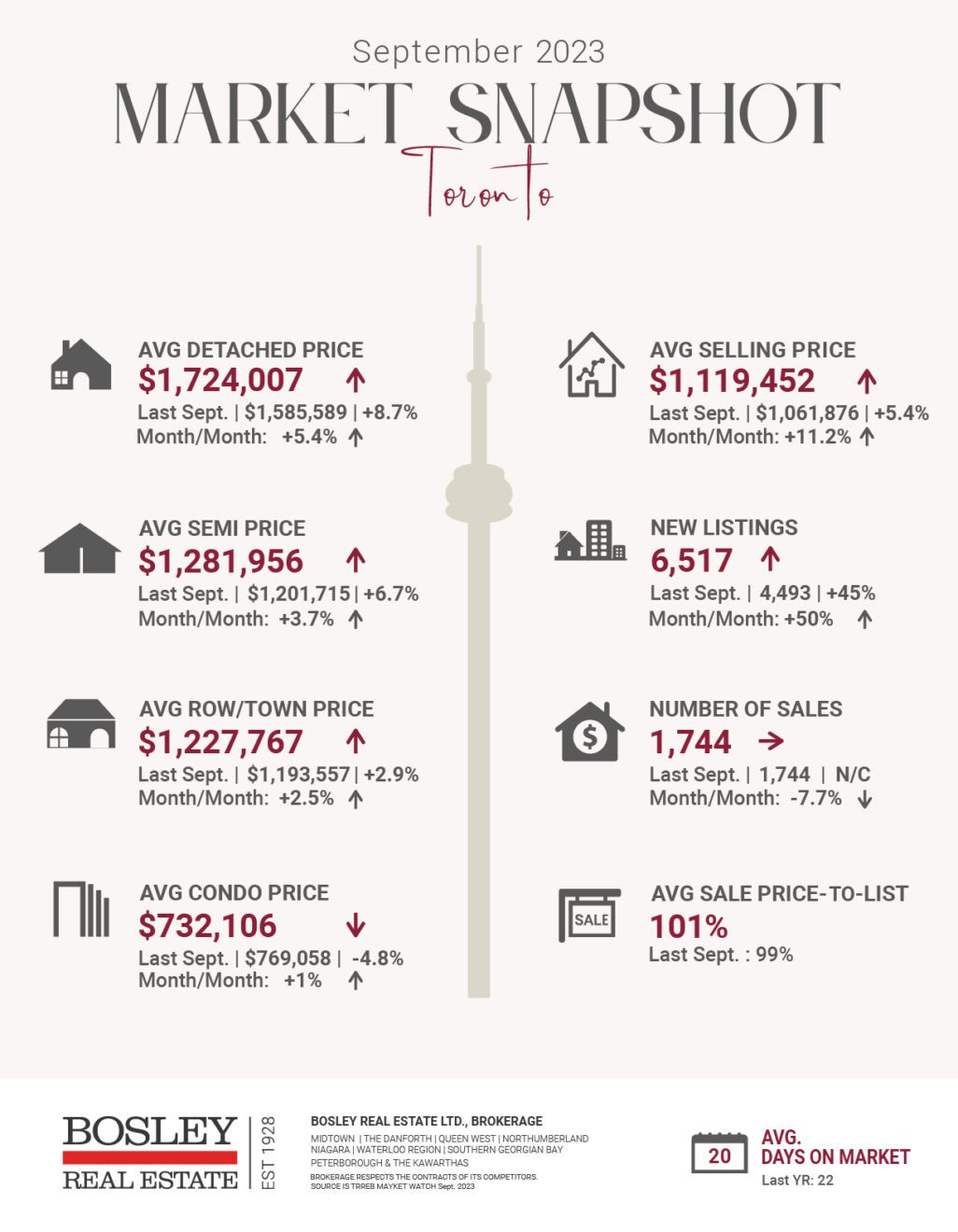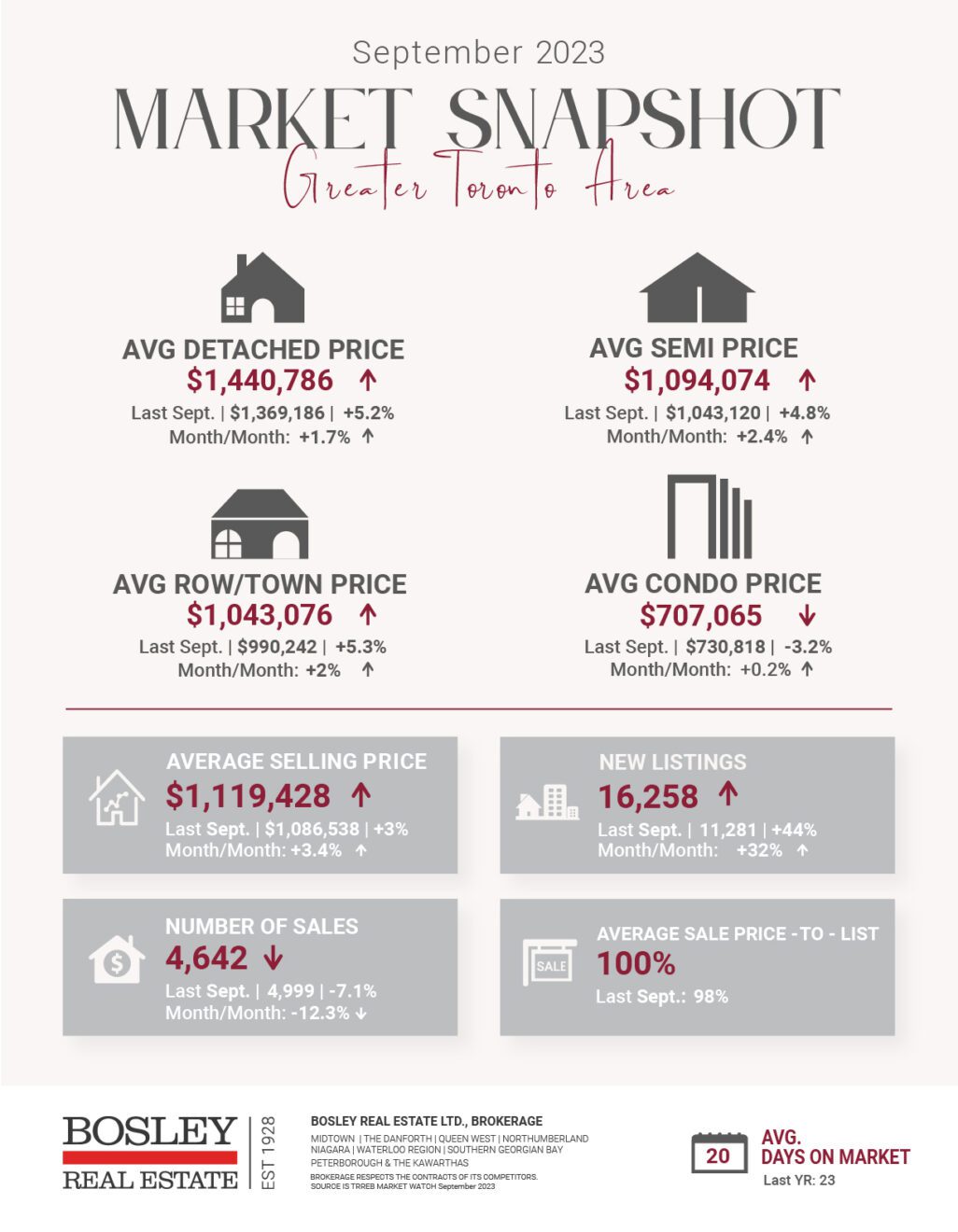


MARKET INSIGHT FOR THE WEEK ENDING October 27th
The Bank of Canada says higher interest rates have not dragged down home prices as much as expected, because a shortage of homes in the country is keeping values elevated.
The central bank kept its benchmark interest rate unchanged Wednesday at 5 per cent – up from just 0.25 per cent in March 2022, when the bank began a series of rapid rate hikes intended to bring inflation under control. Over that same period, the typical price of a home across the country has fallen 17 per cent, a modest decline considering the sharp increase in borrowing costs.
“Normally, house prices move pretty lockstep with interest-rate increases,” Bank of Canada senior deputy governor Carolyn Rogers said at a news conference Wednesday, where she was discussing the bank’s decision not to hike its rate further. “As interest rates come down, house prices go up a bit. And they’ll come off as interest rates come back up,” she said.
“We’re not seeing the decline in house prices that we would expect,” she continued, adding that there is a “structural lack of supply” of housing in Canada, and that until it is fixed, interest rates on their own are not going to help us get back to a housing affordability situation or solution.”
Bank of Canada Governor Tiff Macklem, at the same news conference, said structural problems in the housing market are contributing to high inflation and impeding the bank’s efforts to cool growth in consumer prices.
The typical home price across the country fell as much as 17 per cent after the Bank of Canada started raising interest rates last year. But home values started to rebound in February this year after the central bank said it would take a break from hiking rates. That break lasted four months, and home prices have started to fall again.
The average monthly rent in Canada has topped $2,000, and typical home prices in Toronto and Vancouver are more than $1 million. The cost of housing in smaller cities is significantly higher than it was before the pandemic, with home prices up by at least 50 per cent in places such as Guelph, Cambridge and Barrie.
The federal government has taken steps intended to spur the creation of more housing. It recently announced a tax break designed to help developers build more rental units, along with plans to boost government-backed financing for the sector. The Ontario government has also cut taxes for new rental home construction.
The bank’s target is not to reach a specific level of interest rates or mortgage rates. The focus is on bringing inflation back under control.
The central bank’s interest-rate decisions directly affect variable-rate mortgages, which have become more expensive with every rate hike. Many of these borrowers have not had to face higher payments, though, because most Canadian banks automatically extend the lengths of amortization periods in these cases, to keep payments steady. Those borrowers will eventually have to make higher payments when their mortgage terms end and they are required to go back to their original amortization periods.
The Bank of Canada is paying close attention to the mortgage renewal cycle. Three of Canada’s largest lenders have disclosed that about 20 per cent of their residential mortgage borrowers are seeing their balances grow, because their monthly payments no longer cover all the interest they owe.

Here are the top 5 trending stories of the week:
- Bank of Canada Holds Rates But Hikes Inflation Outlook “Canada’s central bank made no changes to its key interest rate but the hikes may not be over. As the market expected, the Bank of Canada (BoC) made no changes to rates this morning. Eroding consumer spending and a slow economy were amongst the reasons cited. They did raise their inflation outlook though, indicating hikes may not be over.”
- GTA New Home Sales ‘Surged’ 300% In September — But “One Month Does Not Make A Trend” “Opportunistic buyers returned to the Greater Toronto Area’s new home market in September, new data suggests. The Building Industry and Land Development Association (BILD) reported on Thursday that 1,885 new home sales were recorded across the GTA region last month, marking a year-over-year rise of 303% and “reversing three months of decline.” Even so, BILD says that September’s sales were 32% below the 10-year average.”
- What a rate pause at 5% means for homeowners “Real estate experts say the decision by the Bank of Canada to hold interest rates at five per cent signifies stable – but elevated – borrowing costs for mortgage holders. On Wednesday, the Bank of Canada elected to hold its policy rate at five per cent for the second consecutive interest rate decision. The pause follows a steep series of interest rate hikes that began at a low of 0.25 per cent in March 2022. Alana Riley, head of mortgage, insurance and banking at IG Wealth Management, said told BNNBloomberg.ca that the rate pause offers “welcome relief for Canadians.”
- Toronto rental construction hits 9-quarter low as legislation to scrap GST introduced “The number of purpose-built rental units under construction in the GTA dipped to 18,267 in the third quarter, according to a report released Oct. 24 by real estate consulting firm Urbanation.”
- Toronto sees dramatic spike in landlords evicting tenants to move in themselves “We are getting progressively further away from a time when rent prices in Toronto could be considered affordable, and along with the pressure that high mortgage rates, record immigration numbers and the proliferation of Airbnbs are putting on the rental market, more landlords are evicting tenants to move in themselves — or so they say on paper.”

The Bosley Advantage
Read about the heritage and innovation that form the foundation for Bosley’s industry-leading approach to real estate.




